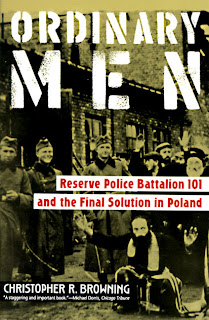Ordinary Men
 Sometime last month I finished reading Ordinary Men: Reserve Police Battalion 101 and the Final Solution in Poland by
Sometime last month I finished reading Ordinary Men: Reserve Police Battalion 101 and the Final Solution in Poland byChristopher Browning, and the experience was disturbing enough that it sent me running to the comforts of Star Wars books for the next couple of weeks.
Ordinary Men is an in-depth study of German Reserve Police Battalion 101, and the way it was used to massacre and round up Jews for deportation to death camps in Poland during World War II.
It isn’t exactly an easy read—long sections of (necessary) background information explaining Nazi policy and wartime police organization plagued by unfathomably long German words are juxtaposed with matter-of-fact accounts of the commission of unspeakable atrocities. But Ordinary Men succeeds in making its point.
That point—that ordinary people placed in unusual circumstances are capable of doing terrible things—is not an unusual one (think Lord of the Flies or Heart of Darkness), but it’s a point that is driven home with more force than usual because this time, it clearly is rooted in historical fact.
Browning argues that the men of Reserve Police Battalion 101 weren’t your stereotypical uber-Nazis. For the most part, they were middle-aged men, rejected by the army and without Nazi party affiliation who were old enough to remember when Nazis weren’t in power and Nazi ideals weren’t the norm. As a whole, they weren’t especially racist, they hadn’t been thoroughly indoctrinated with Nazi propaganda, and they weren’t battle-hardened. They were just ordinary men.
And yet, the vast majority of them found it easier to kill Jews than to stand out from the group.
As Browning concludes:
“…The collective behavior of Reserve Police Battalion 101 has deeply disturbing implications.
There are many societies afflicted by traditions of racism and caught in the siege mentality of war or threat of war. Everywhere society conditions people to respect and defer to authority, and indeed could scarcely function otherwise. Everywhere people seek career advancement. In every modern society, the complexity of life and the resulting bureaucratization and specialization attenuate the sense of personal responsibility of those implementing official policy. Within virtually every social collective, the peer group exerts tremendous pressures on behavior and sets moral norms.
If the men of Reserve Police Battalion 101 could become killers under such circumstances, what group of men cannot?”It’s a chilling question to consider. After all, I’ve always considered myself to be fairly ordinary.















4 comments:
The Lucifer Effect is another good book on this theme. It's written by the guy that organized the Stanford Prison Experiment and he uses it to explain what happened at Abu Ghraib. Just in case you're itching for more on the subject.
I love running to the comforts of Star Wars books.
Colby,
Thanks for the recommendation; I might check it out. Though not nearly on the same magnitude as the Holocaust, the Abu Ghraib incident is in some ways more disturbing, because it strips away any illusions that only other people (Nazis, Communist China, whatever) could behave so atrociously.
Mrs.D,
Me too. Except the new ones where they kill off characters, which I don't find to be comforting at all. Which is why I re-read the old ones that I like.
Post a Comment